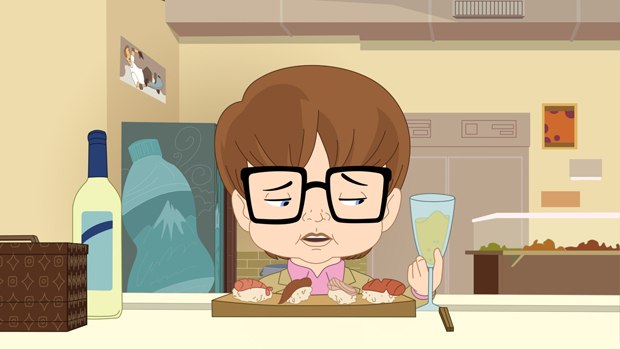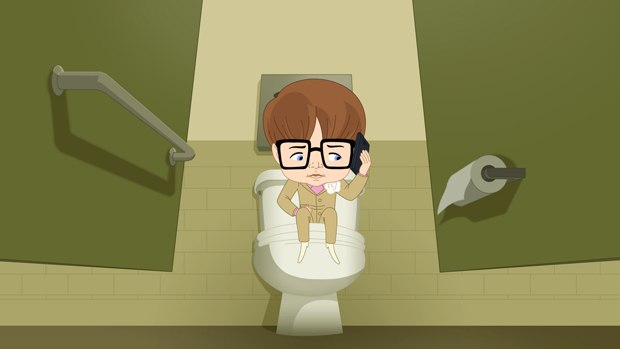Dr. Toon speaks candidly in his post-mortem of the Fox animated series, Allen Gregory.
Not long ago, AWN featured a piece highlighting the animated comedy Allen Gregory and its creator, Jonah Hill. Since that time, the series has been savaged by critics, disdained by audiences, and apparently cancelled after seven episodes. Some reviews have been so unforgiving as to recall the horrors of the animation Slaughterhouse Fall of 2000 (see my November 2000 column).
Why did this sad little series fail? Dead toons tell no tales; the malodorous corpse takes its secrets to the grave. Except for the fact that we are burgeoning animation critics and can thus perform post-mortems, autopsies, and even eulogies if we so choose (don't you love this freedom?) The series failed because it stunk. That much is certain, but we can assume that it wasn't originally intended to stink. Let’s you and I, dear readers, sharpen our scalpels now that the coroner's report is in.
Jonah Hill, at this point in his career, could probably have pitched a show about the manufacture of peanut butter to studio executives, and the green light would have been his. In fact, he had an animated gig prior to Allen Gregory. The Fox Network invited the actor to lend his voice to an animated project, but that was apparently not in line with Hill's dreams of creating an animated show of his own. Hill huddled up with buds Andrew Mogel and Jarred Paul, co-writers of the Jim Carrey Comedy Yes Man (2008). That filmwas a pleasant holiday time-filler but nothing much out of the ordinary. It certainly gave no indication that the writers had the experience to handle an animated series.
Still, ego conquers all, and as I opined eleven years ago:
"When stand-up comics, sitcom writers, would-be film auteurs and semi-experienced trend-riders sign contracts to produce animated series for primetime the result is an embarrassment for all concerned."
Neither Hill, Mogel, nor Paul had any experience with animation besides watching it. Therefore, a consultant, David Goodman (late of Family Guy) was brought in to help. Believing that one can invent, sell, and successfully produce an animated series despite having no previous experience bespeaks great confidence, but ambition alone will never get the job done. In short, if you don't know what you're doing, either take the time to school yourself and learn how or…don't do it.
However, for Allen Gregory, things got worse. Because the show was picked up late – no doubt, by suits convinced that anything Hill did was golden – most experienced animation writers were already working on other shows. This left David Goodman with an inexperienced crew. As a result, Jonah Hill was pressed into duty as one of the writers. At this point any sane executive would have called the project off and told Hill to explore how an animated series was produced and come back next year when experienced hands would become available. There appeared to be a dearth of sane executives at Fox that day.
Allen Gregory was supposed to be a comedy about a preternaturally narcissistic young boy whose glaring disdain for his inferiors (which included everyone) was the show's point of humor. Hill stressed in the AWN interview that it was important for such a character to be "knocked down a peg" and that Allen was "pretentious but vulnerable", a seven-year old wunderkind who "wants to be liked." Whether it was due to the on-the-wing writing, misconception of how his own character operated, or Hill's change of heart somewhere in the first couple of episodes, something completely different emerged.
I have now seen every episode of this series, and can find no evidence of what was originally intended. The arrogance and pretention was there, as was a mean-spirited, repugnant miasma that clouded each episode. With the exception of Julie, Allen's acquired Cambodian "sister", nearly every character displays a startling personality disorder that does not elicit laughs. As in real life, such characters are trying, intrusive, repellent, manipulative, and intentionally destructive. They are more the stuff of vivid film noir than animated cartoons. In a dialogue-heavy cartoon such as Allen Gregory, the repulsive effect is magnified.
Such cartoons, in the hands of skilled and perceptive filmmakers, could be pulled off. What Hill was aiming for, however, was comedy, and he missed the mark so miserably that audiences turned away in disgust, reviewers tore the show apart, and the ratings tanked with each successive episode. In a later interview, held when the ship was sinking, Hill contradicted most of what he said in the AWN piece. In speaking with Maggie Furlong of Huffpost TV, Hill had the following to say:
"We made a show about awful, awful people. We got away with it. The four of us think it's funny that there are these shows that have these awful people, but then at the end they do something really nice and they're not really that bad. We wanted a show where that doesn't happen…I thought it was funny that in our world of "Allen Gregory" they never really get their punishment for being awful. And they almost get rewarded for it, and punished for being a good person!"
This is a long way from designing a show that has arrogance taken down a peg and characters who are vulnerable and want to be liked. This is about designing a show purposely filled with, well, unrepentant assholes, and expecting an audience to respond to them positively.
"So to me, I'd rather have a show that doesn't work out that was totally what we meant it to be and totally punk rock in its spirit than something that was totally vanilla and lasted for two or three seasons because we changed the show to be like any other show on TV…I would go even harder. People have been saying "Oh, the show's so aggressive" or whatever, but to me I think it's totally punk rock that we got this show on Fox and hopefully we get to make more."
The smell of sour grapes is evident here, but so is the sound of inexperience, confusion, and self-absorption. For a wildly successful comedian, Hill appears to be confused about what he really wanted to do with Allen Gregory. That's not necessarily fatal; some terrific animated shows took a season or two to hit stride, but there was a difference: Those shows featured likable characters with whom audiences identified and empathized. Allen Gregory had not a one. If you recall some of the early entries in the Animation Critic series, you may remember the ground we covered in evaluating heroes.
No piece I write will ever be complete without consideration of the larger cultural context. During the time Allen Gregory hit the air, many cities in America were witnessing demonstrations by the various permutations of "Occupy Wall Street". In an atmosphere where many were decrying corporate greed, special interests, and the arrogance of the wealthy in the face of vast economic disparities, Jonah Hill gave us a rich, arrogant, narcissist who treated everyone in his world as his personal sheet of toilet paper. It matters very little for the purposes of this essay if you are with or against this movement: it was huge, widespread, and fervid in its ideology. Bad timing for Allen Gregory.
The execs at Fox were just as much to blame for this debacle. Eager to ride the wave that is Jonah Hill, they green-lighted a project that was certain to be hampered in its development, and also took the risk of oversaturation: Audiences, as was proven eleven years ago, will watch only so much prime-time animation, and Fox already had a full slate of "Animation Domination" on board. It is possible that Allen Gregory was the tipping point.
Not to blame is Bento Box, the Burbank studio entrusted with the show's animation, design and the look of its characters. James McDermott deserves work on a better series, and based on his character designs, should get it. The animation utilizes Toon Boom software to considerable advantage. There is a taste of McDermott's earlier work on King of the Hill, but the characters are more advanced in design, with angular eyes and the ability to convince us that the dialogue matches the character's inner state. This is due to the flexibility of facial expression, one of the problems with King of the Hill.
If only that were enough to save this blighted series.
There are lessons to be learned from Allen Gregory for both critics and future developers who hope to pitch a hit someday, as well as for studio executives, who often seem to have the longest learning curves of all.
First: Experience counts, especially in animation. Whatever track record Hill, Mogel and Paul had in live-action film, they were uniquely unsuited to make an animated series, and proved it. I do not doubt that they could have a productive bullshit session and come up with a viable idea for an animated series, but that is the point at which they should have recognized their inexperience and limitations and turned the idea over to someone who knew better.
Second: A memo to Fox. A big name does not guarantee a blazing hit.
Third: Have some conception of what you truly want your show to be. If you want a show about an arrogant kid getting his comeuppance, wanting to be liked, and compensating for his insecurities, don't claim that you really intended to make a show about "awful, awful people" who revel in their emotional sadism and are never punished, learn anything, or suffer consequences.
Fourth: Another memo to Fox: Have some patience and don't force said inexperienced people (including the neophyte writing team) to play over their heads. There is no reason this project couldn't have gone into development at a more auspicious time. You, as much as Hill, got exactly what you deserved.
Fifth: Is this show congruent with any sort of genre, target audience, or with the cultural context of the times?
Sixth: Did you populate your show with characters anyone could rightfully care about?
In the end, black eyes for everyone involved. As with most tragedies, it began with hubris, and none of it had to happen. I do not especially enjoy writing pieces like this one, and I wish Mr. Hill and company better luck in the future. Still, autopsies must be performed, and in the arena of media it is you, the critic, who must wield the scalpel.
--
Martin "Dr. Toon" Goodman is a longtime student and fan of animation. He lives in Anderson, Indiana.










